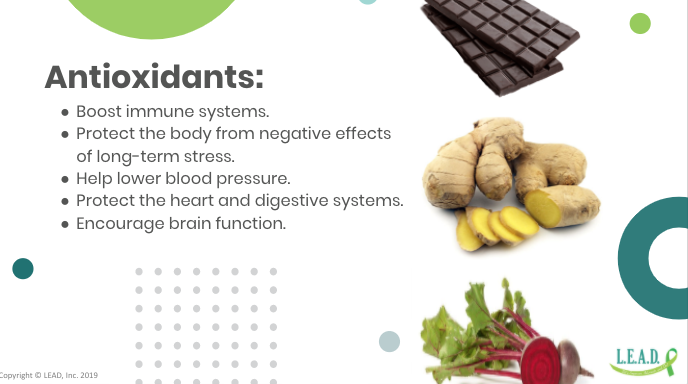By: Titash Biswas, LEAD, Inc. Fellow
Before reading this blog, answer the following questions to yourself.
Since the COVID-19 Pandemic began, have you:
- Felt frustrated or disconnected from others and become less attentive or less engaged when spending time with family?
- Had your normal eating schedule completely disrupted?
- Been using food for comfort, or to help you deal with challenging emotions?
- Felt stressed and anxious throughout the day and even during down times?
Most importantly, do you want to try to reduce your feelings of stress and anxiety through positive food-related habits? If the answer is yes, this blog is for you. Keep reading to learn to prepare meals mindfully in 3 easy steps, by yourself or with your family!
Step #1: Be intentional with the foods you choose.
Actively look for foods that are rich with B Vitamins, omega oils, and antioxidants. These minerals and nutrients effectively break down cortisol, the hormone that causes stress in your body, and have other major health benefits, such as improving your immune system. Avocados are a great example of a “superfood” that contains B Vitamins, omega oils, and antioxidants.
To help you cultivate positive eating habits during the COVID-19 Pandemic and stay-at-home orders, LEAD developed a self-paced, family-friendly e-course called “Eat (With) Your Feelings: Mindful Meals.” Below is a slide from the course, which gives information on the various health benefits of antioxidants. Keep reading for additional sneak peeks!

In addition to consciously choosing healthy foods to reduce chronic stress, there are many ways busy parents can sneak in self-care throughout the day. Be sure to check out our blog “Creating the Ultimate Self-Care Routine for Parents.” This blog offers parents a step-by-step approach to self-care that is easy to try, no matter how exhausted or overwhelmed you may feel.

Step #2: Engage in mindful cooking!
Being mindful means being present in the moment and focusing your attention on your thoughts and emotions, without judgement. The key to mindfulness is allowing yourself to accept any negative feelings you might have and practicing self-compassion.
Practicing mindfulness in cooking involves focusing your attention as you complete every step of the recipe and engaging all of your senses in the cooking process. Take in the sounds and textures of the foods. This allows you to engage in a sensory and emotional experience with the food you’re preparing, creating a delicious and healthy product. Another important aspect of mindful cooking is being aware of how your mood and thoughts change throughout the entire cooking process and bringing your attention back to the task at hand if they begin to wander off. This is called noting. Be sure to put away any potential distractions, such as phones, tablets, music, etc, to channel your attention towards yourself and the food(s) you are preparing.
There are many benefits of mindful cooking that extend beyond the kitchen. Mindful cooking can not only increase feelings of happiness and satisfaction in life, but also decrease stress and irritability. These benefits can prove to be very useful during the COVID-19 pandemic, where people are often faced with increased feelings of anxiety and irritability.
While it is sometimes easier to just throw a frozen dinner in the microwave or the toaster oven, take the time to make cooking a mindful meal an experience and an intentional act of self-care.
The following slide is another sneak peak from LEAD’s “Eat (With) Your Feelings: Mindful Meals” The course also contains fun, guided mindful cooking activities to help you start your path towards mindfulness and a healthier lifestyle.

Step #3: Set up mindful mealtimes for yourself or with family.
Try to eat meals with others at a set time and use these meals to practice mindful eating. With the uncertainty of the pandemic, and stay-at-home advisories, maintaining as much of a schedule as possible is an important factor in boosting your family’s mental health and resilience. For more tips and tools on how to raise mindful families, read LEAD’s, “Ultimate Guide to Raising Mindful Children in a Chaotic World.”
Mindful eating involves slowing down and taking your time while eating. Try to engage all of your senses in the eating process and create a sensory experience to create connections between you, the foods, and others. Focusing on the food itself can allow you to become more aware of your relationships with food and understand exactly what your body needs. The key component of mindful eating is practicing being mindful and not placing judgement on yourself for certain foods or eating habits.

During your mindful meal time, focus on the food and use it as a connection between the others you are eating. Eating at a table, rather than in front of TVs or other screens, reduces distractions and allows you to enjoy a mindful experience with you, your family, and food. Practice expressing gratitude for the food itself and its preparation and let the conversation center around food or food-related memories, not discipline and lectures.
By practicing mindful eating, you can develop a healthier relationship between your body and foods and model a healthier lifestyle for your children. You may also find yourself becoming more confident and self-accepting as you focus on being mindful and eating healthy foods.
What are you waiting for? Enroll yourself or your child in LEAD’s “Eat (With) Your Feelings: Mindful Meals” today! Plus, it’s a great excuse to spend time on screens without feeling guilty…enrich yourself! You deserve it.
ABOUT LEAD, INC.
LEAD, Inc. is the industry leader in mental health education, providing in-person, virtual, and online learning opportunities to individuals around the world.
LEAD’s mission is to (1) strengthen mental health literacy; (2) promote lifelong well-being; and (3) build community resilience.
LEAD’s Learning Lab is your ultimate destination for proactive, tailored, and no-fluff mental health education. Begin learning today!

What are you waiting for? #LEADnow